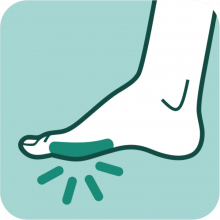Dry feet
What are dry feet
Dry skin occurs due to a decrease in sebaceous gland activity. If you have (extremely) dry feet, the skin is rough and may be flaky and sensitive. Dry skin can itch, feel tight, is tense and extra vulnerable at spots with high odds of folds and chaps. Everyone can get dry feet. However, seniors and people with a medical condition such as diabetes mellitus, rheumatism or skin conditions have increased chances of dry skin. There are multiple causes that can lead to a dry skin. For people with an underlying condition, a dry skin may point at decreased circulation or a loss of feeling in your feet. Dry skin can also be genetically determined. Weather conditions may also influence the state of your skin.
Description (extremely) dry feet
The skin of our feet is different in structure compared to the rest of our body. That is why having dry feet, specifically, is a common issue. About 1 in 3 people suffer from dry feet. At an advanced age, this number is 60%. As we grow older, the skin creates less collagen and elastin. The moisture content in the skin decreases, causing the skin of your feet to become increasingly dry. If your dry feet remain untreated, you may start to suffer from rough skin, pain, blemishes in your skin or chapped skin. In addition to potentially being aesthetically displeasing, your dry feet are also more vulnerable than feet with a properly hydrated skin. You run an increased risk of (open) chapping and you enjoy less protection against bacteria. Do you have a compromised immunity due to an underlying condition, such as diabetes mellitus or a rheumatic condition? Then it is extra important to properly treat your dry feet. A ProVoet pedicurist or medical pedicurist can treat your feet and advise you. For at-risk feet, such as those of patients with diabetes mellitus, rheumatic conditions, cancer, circulatory disease, neurological conditions or dermatological conditions, please schedule an appointment with a medical pedicurist. A ProVoet pedicurist with the designation Diabetic Foot and/or Rheumatic Foot is qualified to treat the feet of people with diabetes mellitus or rheumatic conditions. If required, the pedicurist or medical pedicurist may refer you to the subsequent discipline.
Symptoms dry feet
If your feet have dry skin, the following symptoms may occur:
Redness and/or itchiness Rough skin Cracks and/or tears Calluses and/or chapping Increase of the issue due to changes in temperatureCauses of dry feet
Multiple factors can lead to dry feet, such as:
Washing the feet with (dehydrating) soap Poor drying of the feet Irregular use of cream for the feet Changes in temperature Not wearing socks in the shoes Eczema, psoriasis and other skin conditions that dehydrate the skin Medical conditions such as diabetes mellitus or rheumatic conditions Having cancer or the treatment for cancer Age Obesity (extra pressure on the feet, especially on the heels, can lead to drier skin)What you can do at home
Treating dry feet
If you have dry feet, your pedicurist or medical pedicurist will remove the dry flakes, which often have rough edges. A pedicurist or medical pedicurist that also provides cosmetic treatment, a relaxing scrub and/or peeling can make your skin feel soft again. Any dead skin cells are removed, which stimulates the creation of new skin cells and the uptake of care products. This does not only relax your feet, but also improves their circulation. A cosmetic treatment may also provide your feet with a mask and/or wrapping for an extra hydrating boost. This intensively nourishes your skin and stimulates a thorough healing process. For this treatment, your feet are wrapped to ensure the mask has an optimal effect. The active ingredients are absorbed effectively and the waste products are disposed of. A mask works fast and has that nourishing effect your dry feet need. Such treatments are not provided by every pedicurist and medical pedicurist. If you have at-risk feet, this treatment may not be allowed. The pedicurist or medical pedicurist will remove callus from your feet. After the treatment, they will apply a hydrating cream that is suited to your skin type.
